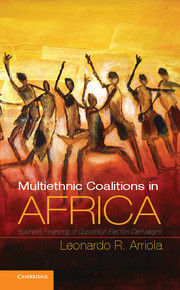Book contents
- Frontmatter
- Contents
- List of Figures
- List of Tables
- Preface and Acknowledgments
- List of Abbreviations
- 1 The Puzzle of Opposition Coordination
- 2 A Theory of Pecuniary Coalition Formation
- 3 The Emergence of Financial Reprisal Regimes
- 4 The Political Control of Banking
- 5 The Liberalization of Capital
- 6 The Political Alignment of Business
- 7 Opposition Bargaining across Ethnic Cleavages
- 8 Multiethnic Opposition Coalitions in African Elections
- 9 Democratic Consolidation in Africa
- Appendix A Commercial Banking Sector Size and Multiethnic Opposition Coalitions in Africa
- Appendix B Sources on Commodity Exports and Ethnic Production by Country
- Appendix C Variables: Definitions, Sources, and Summary Statistics
- Appendix D Multiethnic Opposition Coalitions in Africa, 1990–2005
- References
- Index
Preface and Acknowledgments
Published online by Cambridge University Press: 05 November 2012
- Frontmatter
- Contents
- List of Figures
- List of Tables
- Preface and Acknowledgments
- List of Abbreviations
- 1 The Puzzle of Opposition Coordination
- 2 A Theory of Pecuniary Coalition Formation
- 3 The Emergence of Financial Reprisal Regimes
- 4 The Political Control of Banking
- 5 The Liberalization of Capital
- 6 The Political Alignment of Business
- 7 Opposition Bargaining across Ethnic Cleavages
- 8 Multiethnic Opposition Coalitions in African Elections
- 9 Democratic Consolidation in Africa
- Appendix A Commercial Banking Sector Size and Multiethnic Opposition Coalitions in Africa
- Appendix B Sources on Commodity Exports and Ethnic Production by Country
- Appendix C Variables: Definitions, Sources, and Summary Statistics
- Appendix D Multiethnic Opposition Coalitions in Africa, 1990–2005
- References
- Index
Summary
This book is about interethnic cooperation. It explores cooperation during elections in the places least likely to exhibit it, that is, in countries where ethnicity defines national politics. Early research on democracy in ethnically divided societies suggested that multiethnic coalitions either could not be sustained (Horowitz 1985; Rabushka and Shepsle 1972) or had to be institutionally constrained to remain stable (Lijphart 1969, 1977 ). Since then, political scientists have accumulated considerable knowledge on the factors that affect the success of ethnic parties (Chandra 2004b), the emergence of particular ethnic cleavage structures (Posner 2005), and the manipulation of ethnic labels for partisan advantage (Ferree 2010). We have made less progress, however, in understanding the question that is central to democracy in multiethnic societies: Under what conditions can politicians forge political bargains that span ethnic cleavages? It is in this context that I seek to explain how opposition politicians build multiethnic electoral coalitions in African countries.
My hope is that the theory and evidence presented in the following pages will be of interest to scholars who study the democratization process in multiethnic societies, the political economy of developing countries, and the dynamics of African politics. The explanation I provide could not have been developed without the cooperation of the politicians, party officials, businesspeople, and scholars I interviewed in Cameroon, Ethiopia, Kenya, and Senegal. They generously shared their knowledge of the cut and thrust of politics in their countries. What I learned from them forced me to abandon the preconceived notions I carried with me into the field. Instead, the explanation I advance in this book has been informed by the lessons imparted through their personal narratives. But because the relationship between money and politics remains a sensitive issue in these countries, I have chosen to withhold their names in these acknowledgments and in most of the interviews cited throughout the book for reasons of security. I am indebted to these individuals, and my first thanks go to them.
- Type
- Chapter
- Information
- Multi-Ethnic Coalitions in AfricaBusiness Financing of Opposition Election Campaigns, pp. xi - xivPublisher: Cambridge University PressPrint publication year: 2012

